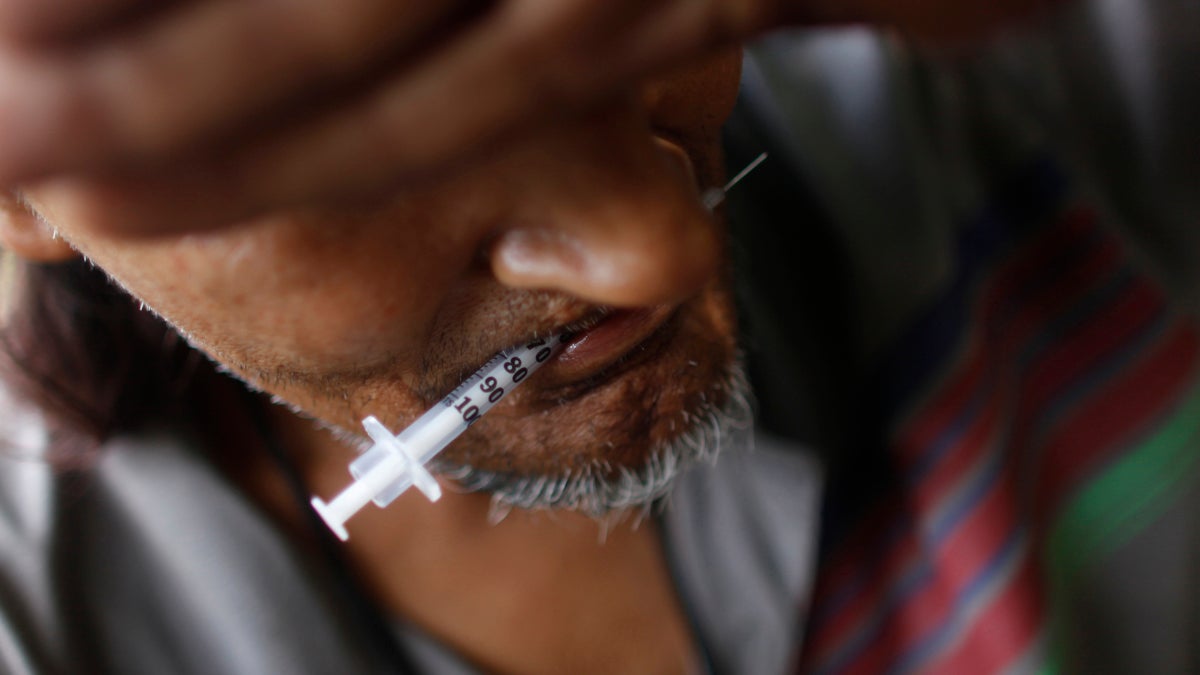Bucks County officials fight apathy, burnout for the county’s overdose problem
Listen
A heroin addict holds a used syringe in his mouth after shooting up. (Brennan Linsley/AP file photo)
The Bucks County District Attorney’s office recently hosted a public meeting to address what it sees as fatigue with the county’s opioid abuse problem.
Keeping up awareness is challenging for any public awareness campaign, but the nature of addiction provides some additional hurdles.
The Bucks County District Attorney’s office recently hosted a public meeting to address what it deems as fatigue over the county’s opioid abuse problem.
“One thing we’ve noticed, people have a tendency to think, as long as it’s not directly affecting them, it’s just another statistic,” said Matt Weintraub, chief of prosecution in the district attorney’s office. The DA’s office recently held a seminar to drive home the point that drug addiction can happen anywhere.
“These our kids, Bucks County kids,” Weintraub said. “So we present a lot of local examples.”
Bucks county had 38 overdose deaths last year and in 2012, up from 19 in 2011. The coroner’s office could not be reached for information on this year’s fatalities.
The county also reports a spike in crimes such as theft, related to addiction. “More and more of our nondrug-related crimes have a drug component … and it’s really been pervasive throughout the county,” said Weintraub. “It spans all races and all geographic counties and the entire economic spectrum.”
Hoping to educate residents on signs of addiction that they might be tuning out, Weintraub plans to hold more outreach to local schools. He says many of the overdoses in the county – fatal or not – happen to young people. The meetings will focus on raising awareness of the signs of addiction and connecting people who are addicted to resources.
“We can’t abandon all hope. We need to continue to beat the drum and raise awareness,” said Weintraub. “If 150 people come and 149 have already heard the message, and we reach that one person, then we’ve accomplished a good objective.”
Keeping ‘compassion fatigue’ at bay
Keeping up awareness is challenging for any public awareness campaign, but the nature of addiction provides some additional hurdles.
Because relapses are often a part of recovery, supporters can grow tired of hearing about new drug problems, according to social worker Eda Kaufman.
“It’s not just first responders, we see it in general. We don’t have a lot of compassion in society for people who struggle with addiction, [and] we have some strong stereotypes about somebody who has an addiction.”
Kaufman has trained agencies on dealing with “compassion fatigue,” which she defines as “the gradual wearing down of the ability to be emotionally present at difficult times.”
She urges those who work in supporting roles for people in drug recovery to build a community for their own mental health needs.
For Weintraub and the DA’s office, apathy is not an option. “The minute that we stop caring, or the minute that we’re too exhausted to fight, the problem will overwhelm us,” he said.
The District Attorney’s office, along with local churches and ministerial agencies, will host “A Day of Hope,” a resource fair aimed at bringing more members of the community into the care, on Sept. 21.
“One of the things we struggle with is trying to put people in touch with the resources they have available to them once they become addicted,” said Weintraub. “There’s a tendency to believe that there’s no way to get off the drugs if they have to do it themselves, [so] it’s to try to make people feel like they’re not fighting this all alone.”
WHYY is your source for fact-based, in-depth journalism and information. As a nonprofit organization, we rely on financial support from readers like you. Please give today.

